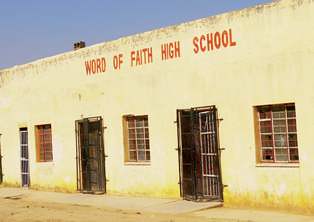
Word of Faith High School targeted by the Lesotho Government for closure in an effort to establish standards for education within the Southern African mountain kingdom. The parliament has set up new guidelines for school licensing., a photo by Pan-African News Wire File Photos on Flickr.
Africa’s Schools Move Toward Improvement and Development
By Estelle Shumann
Africa remains the most impoverished continent on the planet, and poor school systems are one of the many ways this dire state is perpetuated. Thankfully, a handful of African educators are currently exploring methods to improve schools throughout the continent.
With the help of innovative education technology and a lot of hard work, teachers are being trained, high-quality facilities constructed and standardized curricula developed as the state of African education is set to greatly improve.
Based on data collected in 15 sub-Saharan nations between 1998 and 2010, UNESCO recently reported the majority of African citizens are vastly under-educated. Only four countries (Kenya, Seychelles, South Africa and Zimbabwe) reported a primary education completion rate of 60% or higher among adults 25 and older.
South Africa was the only nation with a post-secondary education completion rate that exceeded 10%, and the average tertiary education completion rate for all 15 nations was 1.9%. In contrast, a 2009 report by the National Center for Education Statistics indicates that only 8.1% of American students drop out of high school. Furthermore, 75% of American high school graduates pursue some form of post-secondary education and more than half earn a college degree or certificate.
These low performance rates among Africans are due to a number of contributing factors. According to the UNESCO Regional Overview of sub-Saharan Africa, roughly 33 million African children do not attend school; this is especially true in rural agricultural communities, where parents often forbid their children to attend school so that they may assist with household chores.
Infant mortality rates also play a role, since 163 children out of every 100,000 die before the age of 5. Prevalent fatal diseases, such as HIV/AIDS and malaria, also claim the lives of many students before they are able to complete their education.
Poor academic performance is also commonplace, often because the student does not understand material taught in the country’s national language, which is often a European tongue. Other key factors include untrained teachers and administrators, deficient facilities and, in some cases, students who live in areas where a school is not present.
Statistics aside, the education systems of most African nations greatly differ from those found in the United States. For instance, many African schools charge annual tuition fees for each student. However, according to UNESCO’s overview, the majority of children who attend primary school come from affluent households.
In most African nations, the average annual household income in 2010 was below $5,000. In contrast, public education is free through Grade 12 in the United States, though the average household income is greater than $30,000.
There is also considerably less school district oversight in African than in the United States. As a result, corruption is common among school officials – particularly treasurers.
In response to the African educational crisis, many national governments have taken measures to strengthen schools and their faculties. Their efforts, many of which are funded by outside organizations, include:
--Expanded opportunities for post secondary and tertiary education programs to improve literacy among children and adults;
--Structured after-school activities to increase core competencies among children;
--Informal education programs that teach specific, workplace-related skills to children and adults;
--Household surveys to monitor educational activities at home;
--Training programs for teachers and administrators;
--Standardized curricula for all schools in a given district.
As many of these measures are still in the development stages, the overall impact of their implementation in Africa remains to be seen. However, these programs represent what advocates hope is the first of several crucial steps toward improving the African educational system.
No comments:
Post a Comment